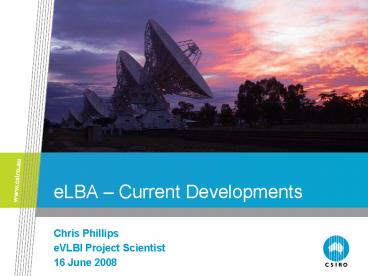eLBA - PowerPoint PPT Presentation
Title:
eLBA
Description:
Compute processes (Core) Incoming data stream is time divided and copied round ... 5 node, dual processor dual core. 4 (Intel) NICs for network flexibility ... – PowerPoint PPT presentation
Number of Views:42
Avg rating:3.0/5.0
Title: eLBA
1
eLBA Current Developments
- Chris Phillips
- eVLBI Project Scientist
- 16 June 2008
2
The LBA
ASKAP
ATCA
Mopra
Ceduna
Parkes
Sydney
Tidbinbilla
Hobart
3
LBADR LBA Data Recorder
- Cousin of MRO/EVN-PC
- Commodity PC with VSIB input card
- Primarily record onto Apple Xserve RAID
- Control software highly modified from original
MRO - Mark5b emulation mode
- eVLBI with TCP or UDP
- Very flexible
- Data written to normal Linux filesystem
- Realtime sampler statistics
- Flexible realtime fringe checking
4
LBA status
- Using DiFX software correlator for all LBA
operations - All disk correlation has been done at Swinburne
University of Technology (Melbourne) - eVLBI correlated at Parkes
- Disk correlation will transfer to Curtin
University (Perth) by August 2008
5
DiFX
- All LBA correlation now runs on DiFX
- Distributed FX
- MPI parallelization on Beowulf style cluster
- Written by Adam Deller at Swinburne University of
Technology - Active development also from Walter Brisken
- Available free of charge for scientific research
- Supports LBADR, Mark5a, Mark5b, Mark5c
- Crucial part of VLBA sensitivity upgrade
- Supports mixed mode correlation
- Easy to add support for new formats
6
DiFX Architecture
- Based on MPI
- Written in C
- Uses IPP libraries extensively
- 2 types of processes
- I/O processes (DataStream)
- Compute processes (Core)
- Incoming data stream is time divided and copied
round robin from DataStream to Core - Asynchronous sends mitigate swarming effect
- Supports disk and eVLBI operation
- TCP UDP, filesystem and native Mark5
7
APSR Cluster
- ATNF Parkes Swinburne Recorder
- Backend for Pulsar processing at Parkes
- 18 node Dell cluster
- Dual processor quad core
- VLBI front end I/O cluster PAMHELA
- 5 node, dual processor dual core
- 4 (Intel) NICs for network flexibility
- Job control from PAMHELA, APSR used as slave
Image Credit Shaun Amy
8
APSR
PAMHELA
Telescope Connections
9
Case Study How not to implement a cluster
- PAMHELA running 32bit Debian Etch
- APSR running 64bit CentOS
- No shared filesystem
- MPI/DiFX does not like mixed 32 and 64bit
binaries - DataStream sending 4 times more data than
receiving - Many issues getting MPI
- Mpich would not scale to use full cluster
- Openmpi seemed to get confused by multiple
interfaces
10
ATNF Observatory Network
- Provided by AARNet
- Pair of dark fiber, carrying multiple 10 Gbps SDH
- 2 x 1 Gbps connection to each observatory
- Used for commodity traffic (web, email, ftp, ssh,
observing etc) and eVLBI - Each link effectively limited to 512 Mbps for
eVLBI traffic - Sydney to observatory can be run at line rate
using bog standard PCs - 989 Mbps user data (evlbi software)
- 20 Mbps typical for scp
11
ATCA
Mopra
To Seattle 10 Gbps
Parkes
Sydney
10 Gbps AARNET3 To Perth
To Swinburne
12
Current eVLBI status
- eVLBI being offered via normal call for
proposals and actively encouraged - 3x512 Mbps ATCA-Parkes-Mopra
- 2x1 Gbps ATCA-Parkes (or Parkes-Mopra)
- Implemented as 2x 2x512 Mbps
- Exclusively layer 2
- Hand crafted traffic engineering for routing,
using multiple VLANS - Connection to Hobart problematic
- Effectively single 155 Mbps shared IP network
- Cannot sustain 64 Mbps TCP reliably
13
http//noc.atnf.csiro.au/
http//noc.atnf.csiro.au
14
Network Upgrades
- 1 Gbps link to Swinburne imminent
- Multi-gigabit access to 10 Gbps AARNet3 backbone
in progress - Implementing VPLS Layer2 over Layer3
- eVLBI to Curtin
- New cluster for ATCA
- 3x1 Gbps using distributed approach
- Still waiting on upgraded bandwidth to Hobart
15
EXPRES-Oz
- AARNet and ATNF Partners on EXPReS project
- Demonstrate realtime eVLBI from Australia to JIVE
- AARNet provided 1 Gbps light paths from Parkes,
Mopra and ATCA to JIVE - CENIC, Pacific Wave, CANARIE, SurfNet
- Science observation of SN1987a at 1.6 GHz
- 11hr observation at 512 Mbps sustained
- Using Mark5b UDP
- 340msec RTT
16
Image Credit Paul Boven,
Image created by Paul Boven Satellite image Blue
Marble Next Generation, courtesy of NASA
Visibible Earth
17
(No Transcript)
18
Contours ATCA 9 GHz super resolved image (0.4
FWHM)
19
e-APT Demo
- Connecting Shanghai and Kashima to Parkes at 512
Mbps - AARNet have provisioned 3x 622 Mbps circuits
- Mixture of SDH and layer 2/3
- AARNet, CENIC, JGN2, CSTNet, Pacific Wave, HKOEP
- Dedicated Mopra-Parkes link
- Presented as gigabit Ethernet
20
e-APT Demo Implementation
- ATNF telescopes using LBADR data format and TCP
- Kashima and Shanghai using JIVE UDP format
- Raw Mark5 data stream with 64bit sequence
- Shanghai using jive5a control on Mark5a
- Kashima written realtime Mark5b converter and
also generate JIVE UDP packets - 1500 MTU used exclusively
21
Image created by Paul Boven Satellite image Blue
Marble Next Generation, courtesy of NASA
Visibible Earth
22
(No Transcript)
23
Internet2 Wave of the Future
- Winners of inaugural award!
- 10 Gbps connection on Internet2 (continental USA)
for 1 year - Possible usage
- eVLBI to Haystack
- eVLBI to JIVE
- Details still being worked through
24
Thank you
ATNF Chris Phillips eVLBI Project
Scientist Phone 61 2 93724608 Email
Chris.Phillips_at_csiro.au Web www.atnf.csiro.au/vlb
i































